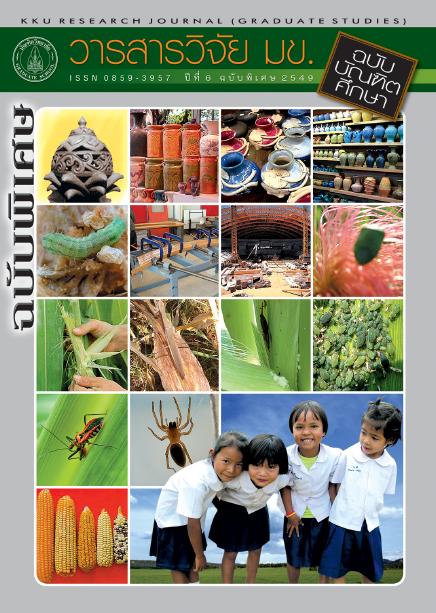The Effect of Motivational Program on Blood Glucose Control in Type 2 Diabetic Patients(ผลของโปรแกรมการเสริมสร้างแรงจูงใจ ต่อการควบคุมระดับน้ำตาลในเลือดของผู้ป่วยเบาหวานชนิดที่ 2)
Keywords:
Motivational program(โปรแกรมการเสริมสร้างแรงจูงใจ), Blood glucose control(การควบคุมระดับน้ำตาลในเลือด), Type 2 diabetic patients(ผู้ป่วยเบาหวานชนิดที่2)Abstract
การวิจัยครั้งนี้เป็นการวิจัยกึ่งทดลอง เพื่อศึกษาผลของโปรแกรมการเสริมสร้างแรงจูงใจ ต่อการควบคุมระดับน้ำตาลในเลือดของผู้ป่วยเบาหวานชนิดที่ 2 โดยประยุกต์ทฤษฏีแรงจูงใจป้องกันโรคของโรเจอร์มาเป็นกรอบแนวคิดในการวิจัยกลุ่มตัวอย่างเป็นผู้ป่วยเบาหวานชนิดที่ 2 รับการรักษาที่ศูนย์สุขภาพชุมชนโนนม่วง ต.ศิลา อ.เมือง จ.ขอนแก่น จำนวน 30 ราย คัดเลือกโดยการสุ่มกลุ่มตัวอย่างอย่างง่าย และแบ่งเข้าสู่กลุ่มทดลอง 15 ราย กลุ่มควบคุม 15 ราย โดยการสุ่ม กลุ่มควบคุมเป็นกลุ่มที่ได้รับการพยาบาลตามปกติจากทีมดูแลสุขภาพเดิมของผู้ป่วย ส่วนกลุ่มทดลองได้รับโปรแกรมการเสริมสร้างแรงจูงใจ ซึ่งผู้วิจัยสร้างเองตามแนวคิดทฤษฏีแรงจูงใจป้องกันโรคของโรเจอร์ โดยแบ่งการจัดออกเป็น 3 โปรแกรมย่อย ได้แก่ (1) เสริมสร้างความตั้งใจในการปฏิบัติตัว (2) ลดอุปสรรคในการปฏิบัติตัว และ (3) เสริมสร้างความเชื่อมั่นในตนเองในการปฏิบัติตัว ดำเนินกิจกรรมรายกลุ่ม โดยการอภิปรายกลุ่ม การนำเสนอตัวแบบสัญลักษณ์ การพูดจูงใจโดยผู้วิจัย และกิจกรรมรายบุคคล โดยการติดตามเยี่ยมบ้าน การโทรศัพท์ ใช้ระยะเวลา 12 สัปดาห์ เครื่องมือที่ใช้ในการวิจัย ประกอบด้วย แบบบันทึกพฤติกรรมผู้ป่วย แบบสัมภาษณ์พฤติกรรมการควบคุมระดับน้ำตาลในเลือดของผู้ป่วยเบาหวานชนิดที่ 2 ที่ผู้วิจัยสร้างขึ้นเองจากการทบทวนวรรณกรรม ผู้วิจัยได้ดำเนินการตรวจสอบความตรงตามเนื้อหา โดยปรึกษาผู้ทรงคุณวุฒิ 5 ท่าน และหาค่าความเที่ยงของแบบสัมภาษณ์ ได้ค่า สัมประสิทธิ์แอลฟาของครอนบาค เท่ากับ 0.75 ดำเนินการเก็บรวบรวมข้อมูลระหว่างเดือนมีนาคม 2549 ถึงเดือนกรกฏาคม 2549 กลุ่มตัวอย่างได้รับการประเมินพฤติกรรมการควบคุมระดับน้ำตาลในเลือด และประเมินระดับฮีโมโกลบินเอวันซี (HbA1C) ทั้งก่อนและหลังการทดลอง วิเคราะห์ข้อมูลโดยใช้สถิติทดสอบที (Independent-sample t test, Paired-sample t test)
ผลการวิจัย มีดังนี้ (1) กลุ่มผู้ป่วยเบาหวานชนิดที่ 2 ที่ได้รับโปรแกรมการเสริมสร้างแรงจูงใจ มีค่าเฉลี่ยของคะแนนพฤติกรรมการควบคุมระดับน้ำตาลในเลือดทั้งโดยรวมและรายด้าน สูงกว่า ก่อนได้รับโปรแกรม และสูงกว่า กลุ่มผู้ป่วยที่ได้รับการพยาบาลตามปกติ อย่างมีนัยสำคัญทางสถิติที่ระดับ 0.05 (P < 0.05) และ (2) กลุ่มผู้ป่วยเบาหวานชนิดที่ 2 ที่ได้รับโปรแกรมการเสริมสร้างแรงจูงใจ มีค่าเฉลี่ยของระดับฮีโมโกลบินเอวันซี (HbA1C) ต่ำกว่า ก่อนได้รับโปรแกรม และต่ำกว่ากลุ่มผู้ป่วยที่ได้รับการพยาบาลตามปกติ อย่างมีนัยสำคัญทางสถิติที่ระดับ 0.05 (P < 0.05) ดังนั้น ควรนำโปรแกรมการเสริมสร้างแรงจูงใจนี้ ไปใช้ส่งเสริมพฤติกรรมการควบคุมระดับน้ำตาลในเลือด ในผู้ป่วยเบาหวานชนิด 2
This experimental study (quasi-experimental) aimed to study the effect of motivational program on blood glucose control in type 2 diabetic patients. The conceptual framework was based on Rogers.s Protection Motivation Theory. Thirty type 2 diabetic patients, at Nonmuong primary care unit, were recruited to the study. Sample underwent simple random sampling methods and was randomly assigned into either an experimental group or a control group. The first fifteen patients were randomly assigned into the control group receiving usual care. The other fifteen patients were into experimental group receiving motivational program. The program designed by the researcher based on Roger.s Protection Motivation Theory, was divided in to three subprograms with three main purposes; (1) to reinforce behaviors intention (2) to decrease barrier of behaviors and (3) to reinforce self-efficacy of behaviors. Each subprogram consisted of group activities and individual activities. Group activities included group discussion, symbolic model presentation and verbal persuasion by the researcher. Individual activities included home visit and reminded letter or telephone. The duration of the program was twelve weeks. The instruments used in this study were demographic data questionnaire and blood glucose control behavior questionnaire, which were created by researcher. Content validity had been according to the five experts. Reliability was tested using Cronbach,s Alpha Coefficient giving a value of 0.75. Data were collected during March to June 2006. Blood glucose control behavior and hemoglobin A1C (HbA1C) level were measured before and after the experiment. Data were analyzed using Independent-sample t test to determine differences between groups, and Paired-sample t test to determine differences within groups. The results shown that after receiving the motivational program (1) The patient with type 2 diabetes who received the motivational program had a significant higher mean score of blood glucose control behaviors than before receiving the program and higher than who did not (P < 0.05) and (2) The patient with type 2 diabetes who received the motivational program had a significant lower mean score of hemoglobin A1c (HbA1C) than before receiving the program and lower than who did not (P < 0.05). Therefore, this program is recommended to be used for blood glucose control behaviors improvement in the type 2 diabetic patients.



